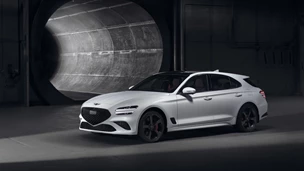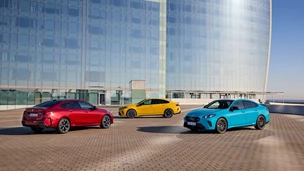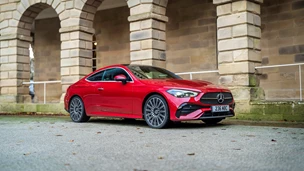The Nissan Leaf is surely one of the most talked-about cars to have been introduced so far in 2011, and enough of the talk has been positive for it to have been voted as Car of the Year by a European jury. It certainly has a place in history, being the first production C-segment (Focus-sized) cars to be entirely battery-powered, and to have been designed that way right from the start rather than being a conversion of something else.Discussions of the merits and demerits of electric cars have been going on for so long that you probably know most of them already, but they're worth reiterating in a review of the Leaf, at least briefly.Firstly, although cars powered solely by electricity have been around since the 19th century, they are still relatively young in terms of development, and for that reason they're also expensive. The UK list price of the Leaf is no less than £30,990, which is £2000 more than Nissan said it would be last year.The problem there is that the exchange rate between the euro and the yen has changed so violently in the intervening period that retaining that price would have been uneconomic. According to Nissan, the true price should now be £2000 higher still, but the company decided to split the difference.In fact, you'll be asked to pay £25,990, the rest being made up by the UK Government's grant for vehicles of this type. That's if you buy it outright - an alternative and more likely scenario is that customers will pay £5775 up front, then £399.54 every month for three years, after which they can pay a final £9758, or switch to a new car, or give the old one back.By early 2013 the Leaf will be built at Nissan's Sunderland factory, which by then will also be building the batteries for electric cars produced by Nissan and its Alliance partner Renault. As the Government grant tapers off, the cost of creating each Leaf will fall, so once the grant runs out completely the sale price will quite possibly remain in the £26,000 range, all other things being equal. Less well-equipped, and therefore cheaper, versions may be on the market by then too.None of this means that the Leaf is likely to be a cheap car in the foreseeable future, but the running costs are low. Nissan reckons that fully charging the battery will cost just £2 (if you plug it in overnight), while there's no car tax to pay, nor any London congestion charge, nor - in some cases - parking fees.Furthermore, business customers will for the next five years be exempt from Benefit In Kind tax, which depending on your circumstances may account for a large proportion of the monthly payments if you choose to buy your Leaf that way.How useful all this is depends to large extent on who you are and where you live. If you live near Central London and have to commute there every day, and the Leaf is your company car, it makes a lot of sense. If not, less so. It also helps if you don't need to make long journeys, or have alternative means of making them, since at best the Leaf's range between recharges is not much over 100 miles.Like hybrids, if not yet to quite the same extent, an important thing about electric cars is how they compare as cars with the conventional opposition. I think it's fair to say that the Leaf is a very long way from being the most attractive C-segment model on the market, though that's partly for technical reasons. Those boggling headlights aren't like that because they look good (which I venture to suggest they don't) but because they direct air round the door mirrors and therefore limit the amount of wind noise.That kind of thing is important, because the Leaf's electric motor is almost entirely silent, and excess wind noise would be disproportionately annoying. In fact, the Leaf is just quiet full stop, even if you switch on the wipers - the wiper motor is quieter than those used in other Nissans because, again, a standard one would make too much sonic impact.As well as being quiet, the Leaf is comfortable enough (there's a reasonable if not extraordinary amount of space for four adults) and supremely easy to drive in town thanks to the beautifully smooth action of the steering, brakes and accelerator. It would be better still if the steering wheel were adjustable for reach as well as height, but I'm afraid it isn't.Reader's Voice: No! Myself: Yes! Reader's Voice: You mean that an epoch-making car devised in the 21st century doesn't have reach-adjustable steering? Surely not. Myself: I know. Weird, isn't it? What were they thinking?The power output is 108bhp, which is reasonable enough and gives the Leaf a 0-62mph time of 11.9 seconds. It feels faster than that figure suggests, though, because maximum torque is available pretty much whenever you floor the accelerator pedal, and it can fairly whistle out of roundabouts.It's not that great to drive out of town, though. The placement of the motor and the underfloor batteries means that the Leaf has a centre of gravity similar to that of Nissan's GTR supercar, and the front-rear weight distribution is as near 50/50 as makes no difference. With these advantages, you'd think that Nissan's chassis people could have devoted no more than a couple of long lunch breaks to making it one of the best riding and handling cars in its class.But no. Sometimes the Leaf wallows, and sometimes it judders. Sometimes, if there are small bumps on an undulating road, it does both at once. This is a big disappointment, but let's not forget that it took Nissan two attempts to make a decent attempt at the suspension of the Qashqai SUV. On that basis, there's still a chance that a better Leaf may be along within a couple of years.The batteries intrude into what would otherwise be a large boot, limiting luggage capacity to 330 litres with the rear seats in place and 680 litres when they're folded. The first figure is pretty good - that's more space than an Astra provides, less than a Focus - but the second isn't what it might be. Practicality isn't helped by the fact that the load sill is high and extends for a long way into the car, while the tailgate tapers inwards. Loading the Leaf with heavy objects might prove to be a bit of a problem.Visibility is conventionally bad, in the sense that most other C-segment cars are every bit as difficult to see out of as this one is. Since the Leaf is in other ways a radical car, it's a shame that Nissan couldn't take the equally radical step of providing more sensibly sized windscreen pillars and some decent glass area at the rear.Overall, the Leaf is a fascinating car which comes closer to bringing electric vehicles into the mainstream than anything that has gone before it. In some ways it should be better, in others it's about as good as current technology allows it to be. But it's also the first car which has ever made me wonder, even just for a few moments, whether the internal combustion engine is really necessary any longer. Power 107bhp Acceleration 0-62mph: 11.9 seconds Top speed 90mph Price £30,990 Details correct at publication date

Our Rating



